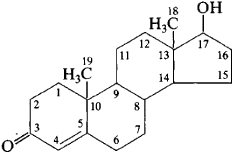testosterone
testosterone
[tes′täs·tə‚rōn]Testosterone
(also 17 β-hydroxyandrost-4-en-3-one), the principal male sex hormone; chemically, a steroid. Testosterone occurs as colorless crystals having a melting point of 155°C. It is sparingly soluble in water but soluble in organic solvents. (The substance was first obtained in 1935. Here, testosterone in crystalline form was isolated from bovine testis tissue, 100 kg of tissue yielding 10 mg of hormone.)
In humans and other higher vertebrates, testosterone is produced by the sex glands, mainly the testes, as well as by the adrenal glands, placenta, and liver. Intermediate products in the biosynthesis of testosterone include cholesterol and progesterone.

The normal level of testosterone in the blood of a man is 0.5–0.6 microgram per 100 milliliters; in a woman, the level is 0.12 microgram per 100 milliliters. A man produces approximately 15 mg of testosterone per day. Testosterone promotes the development of male sexual organs and of secondary sex characteristics. It affects the differentiation of sexual organs and bodily structures of vertebrates developing in the uterus. The concentration of testosterone in the blood probably serves as the factor determining masculinization in males and virilism in females. Other androgens are active only after their conversion into testosterone.
Testosterone is used in medicine in substitution therapy when there are insufficiencies in the functioning of sex glands in men. It is also used for climacteric disorders in women and for certain types of tumors. Intake of testosterone over prolonged periods blocks the secretion of gonadotrophic hormones and suppresses sexual activity. In the pharmaceutical industry, the hormone is obtained from sterols and steroid saponins. Highly active synthetic analogues of testosterone, such as testosterone propionate and methyltestosterone, are used in medical practice.
REFERENCES
Fieser, L., and M. Fieser. Steroidy. Moscow, 1964. (Translated from English.)Heftmann, E. Biokhimiia steroidov. Moscow, 1972. (Translated from English.)
E. P. SEREBRIAKOV